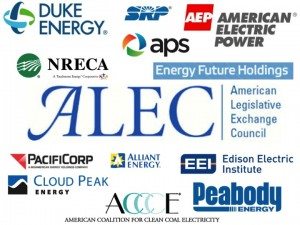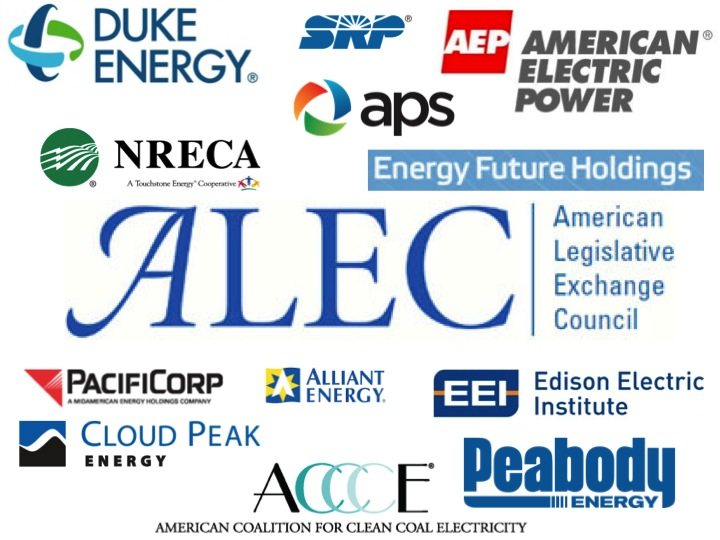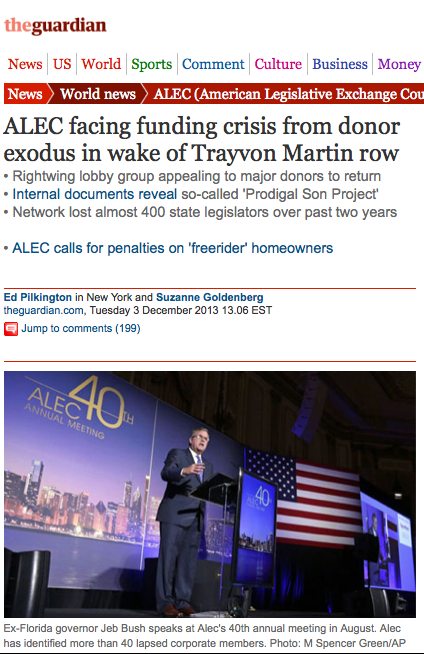UPDATE 12/11/13 from Bruce Henderson at the Charlotte Observer’s Earth & Energy blog: “Duke Energy isn’t saying whether it’s a member of the American Legislative Exchange Council, known as ALEC, the conservative, state-level policy group that is a frequent target of the left.”
Amid a dump of leaked American Legislative Exchange Council documents published by The Guardian last week, North Carolina is asking Duke Energy: Have you finally dumped ALEC?
NC WARN and ProgressNC have both raised the question, based on Duke Energy’s inclusion in a list of “Lapsed” private sector ALEC members featured in The Guardian and an article in the Raleigh News & Observer.
ALEC’s notes for Duke Energy’s lapsed membership, as of April 22, 2013, only say “Merged with Progress Energy, new contacts,” indicating that Duke’s absence was only temporary as new personnel were assigned to participate in ALEC’s work. Duke and Progress merged into the largest U.S. utility company last year.
Duke Energy, North Carolina’s monopoly utility company, has long been a member of ALEC. Last year, Duke Energy refused to leave ALEC even after being petitioned, emailed and called by over 150,000 people to defect. ALEC’s controversial legacy includes blocking climate change policies as part of Big Oil’s 1998 master plan, the NRA’s Stand Your Ground laws, which increase homicide rates, and “Voter ID” bills that suppress legitimate American voters, especially students, the elderly and people with brown skin.
While Duke Energy has resisted calls to dump ALEC, it has responded to the pressure by distancing itself from several items on ALEC’s dirty lobbying laundry list:
- Duke has repeatedly pushed back on any association with ALEC’s Stand Your Ground and voter suppression laws.
- Duke’s call for action to address global warming clash with ALEC’s legacy of climate change denial, including new draft policies to interfere with the U.S. Environmental Protection Agency’s greenhouse gas rules, and a bill that forces teachers to misrepresent climate change science to their students, now law in at least four states, thanks to state legislators implementing ALEC’s model bills.
- Duke has explicitly denounced ALEC’s attacks on state Renewable Portfolio Standards-laws to increase utility electricity generation from cleaner sources. Duke takes credit for helping create North Carolina’s RPS.
So why has Duke Energy resisted popular pressure to leave ALEC, including from its own ratepayers? If Duke doesn’t like ALEC’s history shilling for climate change deniers, nor the National Rifle Association, nor the Republican party’s voter disenfranchisement strategies, what is making Duke stay?
ALEC’s new attacks on rooftop solar electricity producer are right in line with Duke Energy’s attempt to pay back 29% less to homeowners whose solar panels feed extra electricity back into the grid, despite the fact that these homeowners fronted the costs of installing and maintaining solar panels themselves.
Duke is terrified of the prospect of rooftop solar energy, which threatens its century-old monopoly business model. Duke is used to being the dominant company providing power to North Carolina residents, and they can basically charge customers as much as they want. More customers are choosing to install their own solar panels as the technology rapidly becomes cheaper, keeping money in the pockets of ratepayers rather than Duke’s executives.
ALEC’s Updating Net Metering Policies Resolution, discussed last week at its States and Nation Policy Summit in Washington, DC, would complement dirty utilities like Duke Energy that are working to make it more costly for people to feed their own solar power into the electrical grid. See here for ALEC’s new anti-environmental resolutions.
Which Utilities will be Using ALEC’s State Lawmakers to Attack Solar Energy?

ALEC’s utility member companies.
The new ALEC resolution was crafted with help from lobbyists at Edison Electric Institute, the primary trade association for Duke and most other large U.S. utility companies.
EEI’s roster also includes Arizona Public Service (APS), the utility that tried to force Arizona’s residential solar electricity producers to pay $50 per month for feeding unused electricity back into the grid. In the end, the monthly fee was reduced to $5 per month, which still serves as a disincentive for homeowners to install their own solar panels.
As it sought to make net metering more expensive for small-scale solar producers, APS lied to the public, denying its funding of anti-solar TV advertisements run by Koch brothers front groups.
APS recently rejoined ALEC after disassociating for a short year. ALEC’s Energy, Environment and Agriculture task force includes APS and presumably Duke Energy, among other dirty energy giants. The EEA task force is governed by American Electric Power’s Paul Loeffelman and Wyoming state Representative Thomas Lockhart, friend of the coal industry.
Duke Can Still Do the Right Thing
Duke Energy needs to make its intentions clear.
The company can go with the Koch brothers, ALEC, and companies like APS, and financially punish North Carolinians who choose to produce their own electricity. Or, it can finally dump ALEC, its bad policies and anti-democratic processes and shift to a business model that embraces the power of the sun. It can continue to plan around a cost on carbon emissions and phase out dirty coal that aggravates everything from climate change to water pollution to asthma.
We hope to get the right answer from Duke Energy soon.




